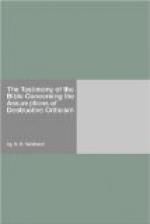We turn to the positive statement in Deuteronomy xxxi. 9. The chapter opens with the declaration that “Moses spake these words unto all Israel,” giving an extended account of what the words were. In the ninth verse it is stated: ... “And Moses wrote this law and delivered it unto the priests and unto all the elders of Israel.” What became of that writing of Moses? Was it lost? Or is the statement false? And did some later writer forge the statement, attributing the writing to Moses, to give weight and authority to the forgery? To ask the question is to answer it. “Moses wrote all the words of the Lord.”
In the twenty-fourth verse in this same chapter in Deuteronomy it is stated that “Moses had made an end of writing the words of this law in a book.” Yet the critics teach that this book, Deuteronomy, was not written until after the exile, almost a thousand years after the events narrated. Does not critical credulity make larger demands than are laid on faith?
The summing up of the book of Numbers, of what had been said and written in the book, is stated in the last chapter and last verse, namely, that “these are the commandments and the judgments which the Lord commanded by the hand of Moses unto the children of Israel.” Again and again it is affirmed in the Pentateuch that God commanded Moses to write, and that he did write, but the critics affirm that the hand of Moses had nothing to do with producing the books of the Pentateuch—that they were written after the exile!
Not only does the Pentateuch distinctly teach the Mosaic authorship of the five books of Moses, appropriately so called, but all the Old Testament saints entertained the opinion which the Jewish people and the Christian Church hold to-day, that God spake to Moses, and that Moses committed to writing the messages that God gave him and commanded him to write, embracing the story of God’s miracles, his instruction and dealing with them in the wilderness.
We find the critics contradicted in the Scriptures from Joshua to Malachi. To Joshua God said: “As I was with Moses, so will I be with thee.” (Joshua i. 5.) Eight times in the first chapter of the book of Joshua God accredits Moses with having received and having given the law to Joshua and the people.
The Pentateuch is the book which God, speaking to Joshua, calls “the law which my servant Moses commanded thee” (Joshua i. 7), and it was so accepted by Joshua. Was he mistaken? or the critics? He had long enjoyed most intimate relations with Moses, and knew what Moses had written by the command of God.
David affirms that God had “made known his ways unto Moses, and his acts unto the children of Israel” (Psa. ciii. 7). We have seen that the man Moses was competent to write, and did write, what God had made known to him (Deut xxxi. 24). The Psalms are illuminated and set aflame with the faith of Israel, that Moses said and wrote what is ascribed to him in the Pentateuch.




